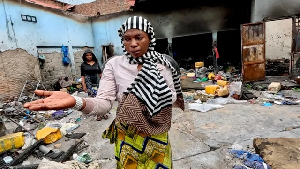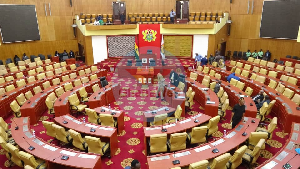Accra, Sept. 10, GNA - The National Spiritual Assembly (NSA) of Baha'is of Ghana, on Friday appealed to the Iranian Government to rescind the unfair prison sentence on seven members in Iran in June this year.
In addition, the Assembly called for the immediate release of the prisoners on bail while the Iranian Government expedited a fairly appeal that respected international standards of jurisprudence.
Dr Kwesi Osei, Member of the Office of Public Information of NSA, made the appeal at a press conference in Accra.
He noted that the arrest and imprisonment without charges for 20 months before trial; had been unfair as the prisoners were prevented from seeking any legal counsel throughout the period before their trial and sentenced to 20 years imprisonment each on June 14, 2010.
Dr Osei said although various governments, human rights groups and organisations and the media world-wide had called for the release of the prisoners, they had not yielded the needed results from the Iranian Government.
"The Assembly in Ghana also deems it prudent to bring up the appeal on the occasion of the Eid-ul-Fitr to create much public awareness of the injustice being meted out to some of its members in Iran, a predominantly Islamic nation and request for justice," he added.
He explained that seven of its members were the ad-hoc group that supervised the spiritual needs of Baha'is in Iran, until their arrests were called Yaran-i-Iran, meaning "Friends of Iran".
"They respected and obeyed the laws and tenets of their country, but were arrested, charged with espionage, propaganda against the Islamic Republic and the establishment of an illegal administration and though they had rejected completely and categorically all the charges levelled against them, had been unfairly tried and imprisoned, Dr Osei added.
He said Baha'i society worldwide believed that the arrest and imprisonment of its members in Iran was nothing more than an opposition to the Baha'i Faith, a religion, which was though founded by an Iranian, had faced great opposition from the Islamic community in Iran since the 1979 revolution.
Dr Osei pleaded that since the Iranian Government was a signatory to the United Nations (UN) International Convention on Civil and Political Rights, which upholds the right "to have or to adopt a religion or belief of (one's) choice," and "to manifest (one's) religion or belief in worship, observance, practice and teaching," it was not right to prevent any of its citizenry from freely associating themselves with another religion apart from Islam and must therefore respect its own legal bindings.
He said "even the arrest and imprisonment of the seven for 20 months without access to any legal counsel or charges was a clear breach of the nations' own statutes governing operations in Iran which restricts the holding of inmates in solitary confinement to not more than 20 days".
Dr Osei appealed to the Ghanaian media to support through mass education to help effect the needed change and impact in revoking the test case of great human rights abuse in Iran and help bring about justice to ensure peaceful co-existence of all religions around the world.
Religion of Friday, 10 September 2010
Source: GNA
Baha'is of Ghana appeal to Iranian Government
Entertainment















